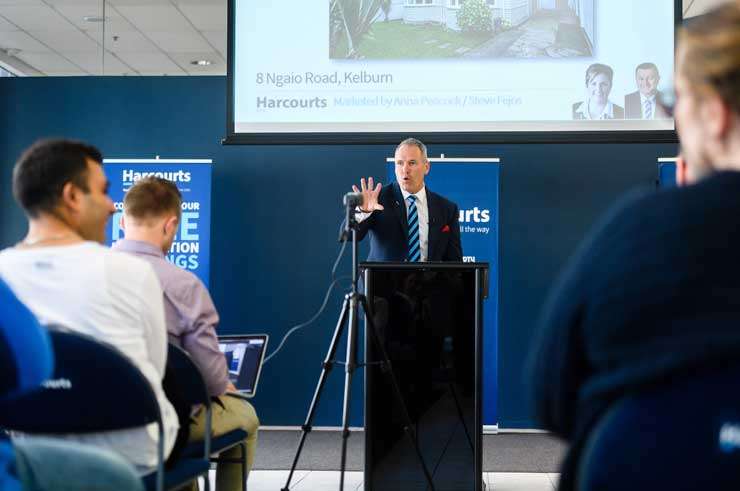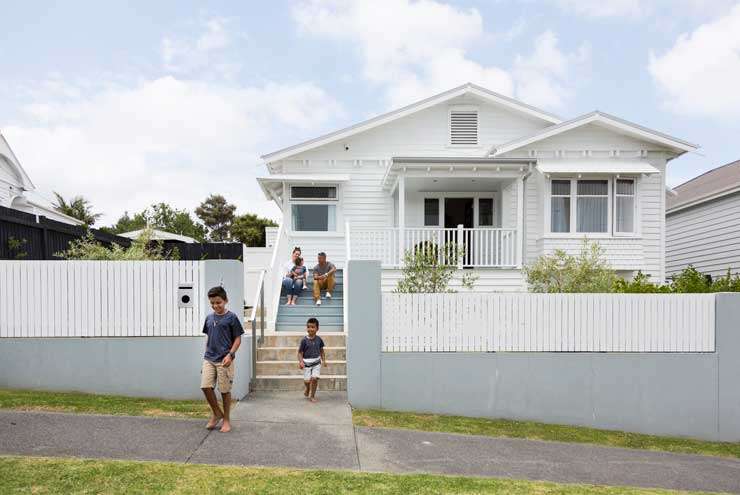The housing market slowdown is a “golden ticket” for first home buyers, says Lesley Harris, director of the First Home Buyers Club.
“There are still a lot of obstacles for first home buyers, such as getting finance, but the ones who get over that hurdle are finding it easier to buy,” Harris says.
In a cooling market, buyers who understand how auctions and price negotiations work can game them to their favour. Less competition and more stock on the market also help.
Harris says the fact that more and more properties are being advertised with a price is a game-changer for buyers, while the slower market pace allows buyers to put in conditional offers.
Start your property search
However, Harris advises buyers not to hold off waiting for prices to fall. “I wouldn’t be playing that card. Buying a home is a long-term investment,” she says.
Auctions – what buyers need to know
In a cooling market, the strategy of pre-auction offers might be successful, says Harris, but the steady drop in clearance rates mean post-auction offers are becoming much more prevalent in 2022. “The feedback from first home buyers is that more properties are passing in at auction. When a vendor doesn’t get the price they wanted at auction, they have to adjust their expectations, and that’s quite a nice little window for buyers to make an immediate post-auction offer.”
There are many different auction strategies, says Debbie Roberts, investment coach at Property Apprentice. “I think it’s a really good idea for first home buyers to go and have a look at auctions. It can be intimidating, and there are a lot of specific terms that auctioneers and real estate agents use.”
Buyers need to make sure they have an auction strategy to avoid getting carried away with emotion, says Roberts.

First Home Buyers Club director Lesley Harris says vendors will adjust their expectations if their property passes in. Photo / Supplied
One of her favourite strategies is to start bidding higher than the auctioneer. “If, for example you think the market value is $750,000, the auctioneer might start the auction at $650,000. You could open the bidding at $700,000. A $50,000 increase might scare a few people.”
Other tips include:
• Be aware of the mind games in the room. The agents and auctioneers are all acting on behalf of the vendors, so all want to get the highest price possible and keep buyers bidding.
• Bring an experienced bidder along who can offer advice, and/or step in to say “stop” if need be.
• Avoid being the first to bid if there are multiple bidders. Wait to start until others are getting stressed.
• Bid confidently. Other bidders often think buyers who bid confidently have the money to go higher. Never look too keen.
• Watch out for agents trying to pressure buyers with words of urgency.
Often in a cooling market there are no bidders at the auction, and the property is passed in. That often means the vendors are open to negotiating on price. “Wait until it passes in, and then put in an offer afterwards,” Roberts
Harris says there are some benefits to making a bid on the property you are interest in. In many cases, vendors will deal with the highest bidder. It also shows vendors you want the property and are prepared to make a deal.
A cooling market also provides buyers the opportunity to make conditional offers, often within an auction setting.

Inside a Wellington auction room at the height of the housing market frenzy. Condition have changed since. Photo / Getty images
Many first home buyers find themselves locked out of auctions because they might need final approval from the bank or a registered valuation or building report, which they might not be able to arrange in time.
Roberts points out that buyers can ask for a variation of agreement on the auction document before the auction. That might include variations from the standard deposit, the date of settlement, access to the property for renovations before settlement, and other variations. The seller can chooses to accept or reject these variations but the changes in the housing market may make some sellers more open to accepting variations.
Negotiations – how buyers can take the lead
First home buyers who can’t or don’t want to bid at auction are seeing many more properties listed for negotiation, says Harris. The first tactic for negotiation is to have all their ducks in a row, including finance and due diligence, so they can move fast.
“You might be able to pick up a bargain,” she says.
Vendors who have listed their properties for sale by way of negotiation are also more open to offers with conditions. Harris says speed and simplicity are key.
The best tactic there is to ensure the conditions are not too onerous. Conditions such as finance or building report should be kept to a short time period such as a few days, she says.
“You can say ‘We have pre approval but want to have two days to make sure we get pre-approval for this particular house’. The fewer conditions the better. Then it’s as close to a cash offer as possible.”
Roberts says her favourite market for negotiations is a cooling one. “You don’t have to feel pressured by real estate agents. They can be very good at what they do and be quite intimidating. Their job is to push the price up as much as they can,” she says.
“Patience is key. You don’t need to worry so much about missing out, you can take your time with negotiations.”
Buyers should quiz the agents on the vendor’s situation, says Roberts. “Sometimes settlement date can be more important for some vendors.” They might be willing to take a lower price to get a quick settlement.

Buyers have better chances of landing a bargain or the house they want in a cooling market. Photo / Getty Images
Agent Monday real estate agent coach Andrew Duncan says the key thing to know is how many potential buyers there are. If it’s only one person, then the negotiation will be different to a home that multiple buyers are interested in.
“If you're the only offer, don’t be a dick about it. Try to be realistic otherwise, you will alienate the person you are trying to get alongside. Especially in this day and age, people are aware what’s happening in the market. They can look on OneRoof to see what’s going on.”
Don’t low-ball the seller with $200,000 under on a $1.2m property, Duncan says. “Maybe go in $50,000 to $60,000 under.”
With a low ball offer a vendor might just refuse to play ball at all, say "not even close” and simply not put a counter offer in.
Instead try to work with the other party. It’s common to offer something other than money, such as quick, or delayed settlement if it suits the seller, or shorten the conditions say from 10 days to 5 or 3 as a sweetener.
Duncan says buyers should complete the paperwork in their own time, so that the agent isn’t turning up at 9pm at night or even midnight when buyers may not be at their best.
When buyers make offers, they should try putting in more than one number and crossing the lower ones out, so the vendor thinks they have already come up. An example might be: $800,000, $825,000, $870,000. Then move by small amounts with every counter offer, says Duncan.
Buyers should keep the sales person on their toes. For example, buyers shouldn't warn agents they’re about to make an offer, says. If they aren’t forewarned of offers, they can’t rustle up other offers in the meantime.
Finally, don’t let pride get in the way of clinching the deal, says Duncan.










































































